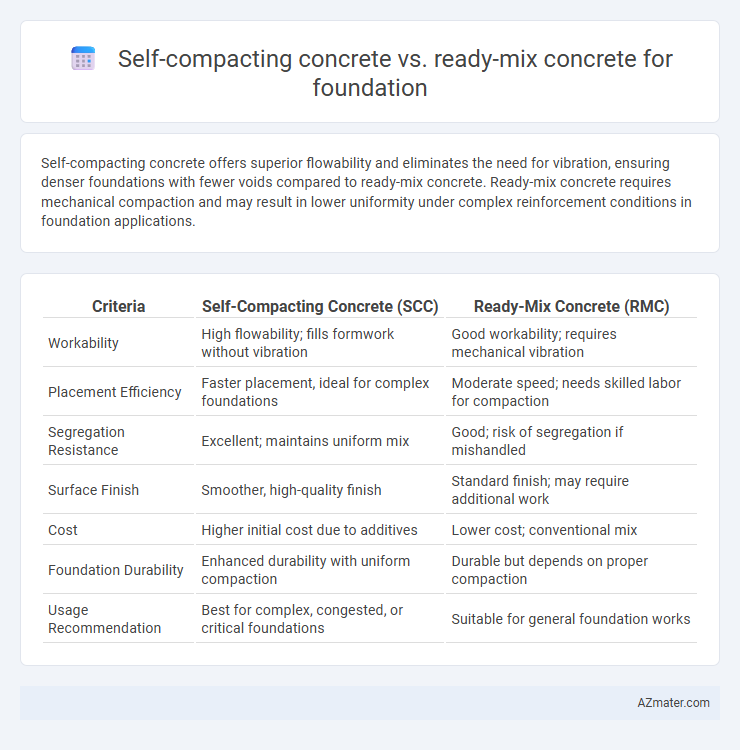Self-compacting concrete offers superior flowability and eliminates the need for vibration, ensuring denser foundations with fewer voids compared to ready-mix concrete. Ready-mix concrete requires mechanical compaction and may result in lower uniformity under complex reinforcement conditions in foundation applications.
Table of Comparison
| Criteria | Self-Compacting Concrete (SCC) | Ready-Mix Concrete (RMC) |
|---|---|---|
| Workability | High flowability; fills formwork without vibration | Good workability; requires mechanical vibration |
| Placement Efficiency | Faster placement, ideal for complex foundations | Moderate speed; needs skilled labor for compaction |
| Segregation Resistance | Excellent; maintains uniform mix | Good; risk of segregation if mishandled |
| Surface Finish | Smoother, high-quality finish | Standard finish; may require additional work |
| Cost | Higher initial cost due to additives | Lower cost; conventional mix |
| Foundation Durability | Enhanced durability with uniform compaction | Durable but depends on proper compaction |
| Usage Recommendation | Best for complex, congested, or critical foundations | Suitable for general foundation works |
Introduction to Self-Compacting Concrete and Ready-Mix Concrete
Self-compacting concrete (SCC) is a highly flowable, non-segregating concrete that spreads into place and around reinforcement without mechanical vibration, enhancing construction efficiency and surface quality. Ready-mix concrete (RMC) is a pre-mixed, factory-produced concrete delivered to construction sites in a plastic state, ensuring consistent quality and facilitating large-scale foundation projects. The choice between SCC and RMC for foundations depends on factors such as site accessibility, complexity of formwork, and desired finish, with SCC offering superior filling ability in congested reinforcement areas.
Key Differences Between Self-Compacting and Ready-Mix Concrete
Self-compacting concrete (SCC) flows easily under its own weight, eliminating the need for vibration, resulting in uniform compaction and reduced labor for foundation work. Ready-mix concrete (RMC) requires mechanical compaction and is typically mixed at a batching plant before transportation to the construction site, offering consistent quality but needing skilled labor on-site. SCC is ideal for complex foundations with dense reinforcement, while RMC suits standard foundation applications where vibration and compaction are feasible.
Composition and Material Characteristics
Self-compacting concrete (SCC) incorporates high-range water reducers and fine particles like silica fume to achieve high flowability without segregation, making it ideal for complex foundation forms and densely reinforced structures. Ready-mix concrete (RMC) relies on conventional mixes with controlled water-cement ratios, ensuring consistency and strength through standardized batching processes but requires vibration for compaction. SCC's optimized particle packing and viscosity-modifying agents enhance workability and reduce labor, whereas RMC's reliance on mechanical compaction suits projects with straightforward foundation designs.
Workability and Placement Efficiency
Self-compacting concrete (SCC) offers superior workability compared to ready-mix concrete, flowing effortlessly into complex foundation forms without the need for vibration, which significantly reduces labor and placement time. The high fluidity of SCC ensures uniform compaction and minimizes voids, enhancing the structural integrity and durability of foundation elements. In contrast, ready-mix concrete requires mechanical vibration and skilled labor for proper consolidation, potentially increasing placement time and the risk of honeycombing.
Strength and Durability Comparison
Self-compacting concrete (SCC) exhibits superior compressive strength and flowability compared to conventional ready-mix concrete, making it ideal for complex foundation forms without the need for vibration. The enhanced microstructure of SCC results in improved durability, resisting cracking, corrosion, and freeze-thaw cycles, which extends foundation lifespan. Ready-mix concrete offers consistent quality but often requires mechanical consolidation, potentially leading to compaction variability affecting long-term strength and durability in foundation applications.
Suitability for Foundation Applications
Self-compacting concrete (SCC) offers superior flowability and filling ability, making it highly suitable for complex foundation forms and densely reinforced structures where vibration is impractical. Ready-mix concrete (RMC) provides consistent quality and is ideal for straightforward foundation applications with adequate access for mechanical compaction. When choosing between SCC and RMC for foundations, factors such as site accessibility, reinforcement density, and structural complexity strongly influence the suitability and overall performance.
Cost Analysis for Foundation Projects
Self-compacting concrete (SCC) reduces labor costs and improves placement speed for foundation projects due to its high flowability and minimal vibration requirements, resulting in lower overall installation expenses compared to traditional ready-mix concrete (RMC). However, SCC materials typically incur higher initial costs due to specialized admixtures and precise mix design, which may offset labor savings depending on project scale. Ready-mix concrete offers cost advantages in large volumes with standardized mixes but can lead to increased manpower and time expenses in complex foundation work where SCC's ease of placement provides efficiency gains.
Sustainability and Environmental Impact
Self-compacting concrete (SCC) enhances sustainability in foundation construction by reducing the need for mechanical vibration, which lowers energy consumption and noise pollution on-site. SCC's precise mix design minimizes cement content and maximizes the use of supplementary cementitious materials like fly ash and slag, leading to reduced CO2 emissions compared to traditional ready-mix concrete. Ready-mix concrete often requires more water and energy for mixing and transportation, increasing its environmental footprint relative to the optimized formulations and efficient placement techniques of SCC.
Construction Time and Labor Requirements
Self-compacting concrete (SCC) significantly reduces construction time and labor requirements compared to ready-mix concrete (RMC) due to its high flowability and ability to fill formwork without mechanical vibration. SCC minimizes the need for skilled labor and formwork adjustments, streamlining foundation casting processes and improving overall productivity. Ready-mix concrete requires more labor for compaction and vibration, increasing construction duration and labor intensity on foundation projects.
Choosing the Right Concrete for Your Foundation
Self-compacting concrete (SCC) offers superior flowability and eliminates the need for vibration, making it ideal for complex foundation forms and densely reinforced sections. Ready-mix concrete provides consistent quality and ease of placement for large-scale foundation projects requiring standard strength and durability. Selecting the right concrete depends on specific project requirements, including structural complexity, reinforcement density, and workability needs to ensure foundation integrity and longevity.

Infographic: Self-compacting concrete vs Ready-mix concrete for Foundation
 azmater.com
azmater.com